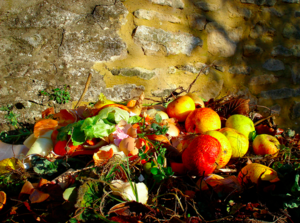
Organic waste refers to any part of plants or animals that have been disposed of or treated as waste and that are biodegradable.[1]
Many councils work with local waste collection companies to collect organic waste.
What things are considered organic waste?[edit | edit source]
Things that can be considered organic waste include:[1]
- Eggshells
- Fruits and vegetables
- Flowers and plants
- Rice and beans
- Dairy products
- Meat, poultry and seafood, bones
- Paper products (paper towel, boxes, food boxes, napkins, paper plates, etc.)
- Parchment paper, wax paper, waxed cardboard
- Pizza and takeaway food boxes made from paper, card
- Milk cartons
- Teabags, coffee grounds, tea/coffee filters
- Garden waste
In terms of whether or not such waste will be collected, you will need to contact the council, municipality or responsible company for an exact list of the items they will and will not collect as organic waste.
Uses for organic waste[edit | edit source]
Organic waste can be turned into compost, fertiliser, soil, etc. In some cases it can be used to produce energy or fuel.[2]
Problems with organic waste[edit | edit source]
Organic waste can be a source of methane, greenhouse gases and pollution.[2] If organic waste is not properly treated or corralled, it can enter water sources and feed bacteria, creating sewage fungus growths.[3]